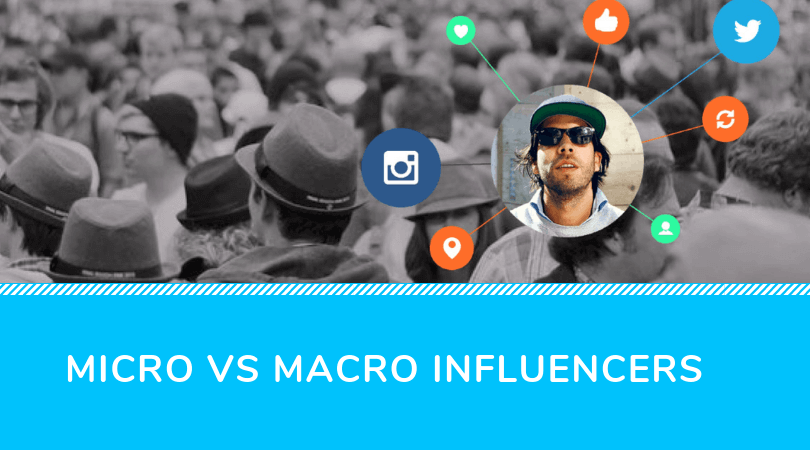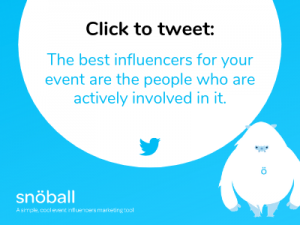Do you know your micro influencers?
Let’s play a quick game: try to identify the best overall influencer for your conference among the options below:
- Kim Kardashian – Celebrity with 58 million Twitter followers
- Bill Nye, The Science Guy – Media personality with almost 6 million Twitter followers
- Your industry’s most notorious trendsetter – 100,000 followers
- Your event’s participants, with a collective reach of approximately 5,000 to 10,000 people
If your first instinct is to side with Kim K. or Bill Nye, you’re not alone. One of the most common preconceptions about influencer marketing is the idea that you need to secure the promotional support of figures with the highest follower counts. While the reach of celebrities can be exceptionally wide, you’re unlikely to enjoy a fruitful return on investment by getting them to promote your event. Geographically and demographically speaking, their followers are too scattershot. Plus, because they do not have a real stake in your event, their support is likely to appear inauthentic – a definite no-no in the world of social media.
If you chose option #3, you’re getting warmer: approaching industry influencers to help with your event’s promotion is a smart move. But this person’s social media presence likely needs to be audited by you first. Do they post content that seems like clickbait? Do their posts receive much engagement, and do they take the time to establish a dialogue? If they don’t, they likely aren’t worthy ambassadors for your event.
The correct answer to our pop quiz on how to find influencers is #4: the best influencers for your event are the people who are actively involved in it. Don’t let their limited reach fool you – these “micro-influencers” can elicit fantastic engagement from a cohort of highly relevant people that have earned their trust. The budget associated with this strategy? Next to nothing.
In this article, we take a closer look at the best ways of identifying the right micro influencers for your event.
How to find influencers: Social Listening
Great micro influencers are out there. To find them, you need to know how to listen. Search for hashtags relevant to your field and identify which people are using them the most. Tools like Hashtagify, Hashtags.org, and Keyhole can quickly give you ideas for related hashtags and inform your search for micro influencers. Remember to focus on hashtags that show a high level of engagement, which may not necessarily be the ones with the most people chiming in. Hashtag tracking tools can make analyzing engagement metrics a piece of cake.
Beyond hashtags, industry-specific LinkedIn and Facebook Groups will give you an idea of who is active, and who routinely gets engagement. Besides determining if a given person seems like they have influence in their circles, social listening allows you to see how they present themselves and if that aligns with your event’s values. If all you needed was a person who’s posts routinely result in a high amount of comments, you’d be ignoring the fact that one way to achieve that is to be very controversial. Major brands have made huge mistakes by aligning themselves with risky influencers such as Kendall Jenner and Pepsi or PewDiePie and Disney. By paying attention to what is happening in the community your event serves, you’ll be able to find the best allies who share your mission and values in order to reach your goals in a long-term and authentic way.
snöball practically lives in the realm of social listening for events. It allows you to monitor the social mentions from your speakers, exhibitors, sponsors, and attendees so that you can track engagement and conversion every step of the way. We take a lot of the guesswork out of who the most influential are among event stakeholders.
Do Background Research on your Micro Influencers
We already alluded to the idea of vetting your potential micro influencers. Look for people that score highest across three categories: reach, relevance, and resonance. Do some digging to learn more about their experience and authority, and quickly scan their list of followers to see the kinds of people that are interacting with their content. Remember that your ultimate goal with influencer marketing is to tap into the power of an influencer’s inner circle, a highly relevant group of potential attendees. You need to make sure that your influencers have strong networks at their disposal that can lead to increased attendance for your event.
Past Events’ Data May Reveal Micro Influencers
What’s great about influencer marketing is its ability to evolve over time based on performance evaluation. Even in the first year of a campaign, there are some great insights to be learned from scouring the data from your past events. Verify which speaker was the most beloved, or which booth was most visited, and tap those people to play a bigger role in the promotion of your event. When conducting your post-event survey, make sure to include a question asking which people or organizations your delegates would appreciate seeing involved in future events.
By using snöball, you’ll always know which of your micro influencers were the most active. This allows you to continuously refine your strategy for the future to obtain a truly next-level influencer marketing campaign.
Higher Cost Solutions
BuzzSumo
A very popular content marketing and curation dashboard with the added benefit of displaying a list of the top influencers in your field, filtered by bloggers, companies, and journalists.
Influencer Marketing Firms
There are a number of boutique and full-service agencies that now offer influencer marketing along with public relations services, including sensov/ event marketing and Word of MICE. B2B and B2C firms provide additional options and can help you navigate the legal aspects of your influencer agreements.
Industry Polling
Polling allows you to focus on as niche a target as you’d like by creating focused questions in places only frequented by your target audience. Working with industry publications and associations to determine who their readers and members respect can yield a lot of high-quality influencer leads. Advertising arrangements that include polling in email newsletters can also guide you as long as you keep it simple (“this or that” questions and minimal options are best). Polling past attendees is a luxury that events with a legacy have. Often, the highest ranking speakers from your surveys make for great influencers and that is polling you’ve likely already put in motion.
Analytics
There are technologies and specialists who focus on sifting through large amounts of data to give you actionable information to make decisions on a variety of event-related needs, including influencers. Analytics companies like Bear Analytics specialize in parsing through your event data to uncover different ways of growing your event. Social media walls have become a staple of many event categories because they are effective behavior modification tactics. The increased social data that comes from their use is coupled with hashtag-based analytics. Resources such as Tint provide customizable social media displays with tracking such as reach rankings and engagement leaders. Even event analytics such as RFID beacons can be used to determine which of your speakers, sponsors, or activations had the most foot-traffic, which you could then use to determine who at your event had the most buzz.
Bottom Line
To find the perfect influencers for your event, choose quality over quantity. Reach and fame plays a role, but never at the expense of relevance and resonance. Look to the people who have earned the most trust in your community, and never underestimate the power of your event’s stakeholders in promoting it effectively.
There are lots of methods to determine who your highly-relevant micro influencers may be. snöball was designed to determine who they actually are. Book a 17-minute no-obligation demo today and discover how our cool technology turns the people at the heart of your event into powerful influencers.



